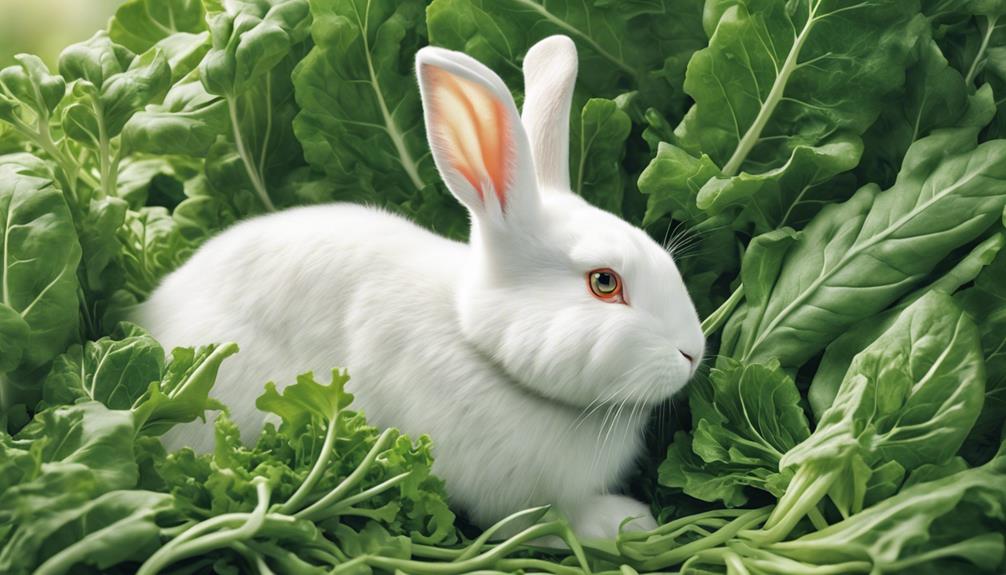When considering how rabbits can safely consume pomegranate, it is crucial to be mindful of the potential risks linked to this fruit. Excessive sugar content can lead to health issues, therefore it is recommended to offer small portions. It is better to choose the flesh and pulp instead of the skin and seeds, as they are more challenging to digest. If you are interested in understanding how pomegranate can be included in your rabbit’s diet for their overall health and happiness, further research is suggested.
Key Takeaways
- Introduce pomegranate flesh slowly to monitor digestive tolerance in rabbits.
- Offer pomegranate leaves as an occasional treat for variety, watching for any adverse reactions.
- Avoid feeding rabbits pomegranate seeds due to potential digestive disturbances.
- Limit pomegranate treats to small amounts to prevent health issues like obesity.
- Opt for whole pomegranate fruits over juice to provide essential nutrients and hydration.
Potential Risks of Pomegranate for Rabbits
When assessing the potential risks of pomegranate for rabbits, it's important to be mindful of the high sugar content that can result in various health issues such as gastrointestinal stasis, obesity, and dental problems.
While rabbits can enjoy a variety of leafy greens, pomegranates, with their high sugar content, pose risks that can lead to digestive issues. The acidic nature of pomegranates can upset a rabbit's delicate stomach, potentially causing diarrhea and other discomforts.
Additionally, the seeds, though not toxic, contain oil, fiber, and tannins that may be challenging for a rabbit's digestive system to process, leading to potential unsafe conditions. It's vital to monitor a rabbit's intake of sugary fruits like pomegranates to prevent obesity and dental problems.
Being aware of the risks associated with feeding pomegranates to rabbits is essential in maintaining their well-being and overall health.
Feeding Pomegranate Skin and Seeds

Feeding rabbits pomegranate skin and seeds should be avoided due to potential digestive issues and lack of nutritional value. When it comes to offering pomegranate to your furry friend, remember these points:
- Texture Troubles: The tough and bitter nature of pomegranate skin can be challenging for rabbits to digest effectively.
- Nutritional Void: Pomegranate seeds don't provide any significant nutritional benefits and may even contain harmful compounds like cyanide.
- Digestive Dilemmas: Seeds could potentially lead to digestive disturbances in rabbits, making them best left out of their diet.
- Better Alternatives: Instead of the skin and seeds, focus on giving rabbits the safe flesh and pulp of pomegranate fruits for a more digestible and enjoyable treat.
Offering Pomegranate Leaves to Rabbits
Pomegranate leaves can be a suitable occasional treat for rabbits, offering a source of variety in their diet. While rabbits eat various types of greens, pomegranate leaves can provide a unique flavor experience. However, it is essential to remember that these leaves offer minimal nutrition compared to the fruit itself. When introducing pomegranate leaves to your rabbit, it is important to do so slowly. Assess your rabbit's tolerance and preferences by monitoring their behavior after consuming the leaves. Keep a close eye on them for any signs of digestive distress or unusual behavior. This cautious approach guarantees that your rabbit can enjoy the variety in their diet without experiencing any negative effects.
| Aspect | Details |
|---|---|
| Feeding Frequency | Occasional treat |
| Nutritional Value | Minimal compared to the fruit |
| Introduction Method | Introduce slowly, assess tolerance |
| Monitoring | Monitor behavior for any distress |
Pomegranate Juice for Pet Rabbits
In order to guarantee the well-being of your pet rabbit, it's recommended to avoid providing pomegranate juice because of its high sugar content and possible negative impacts on their digestive system. Liquid pomegranate juice lacks the beneficial fiber found in the fruit, which is essential for rabbit digestion. Concentrated sugars and acids in pomegranate juice can lead to digestive upset and potential health issues in rabbits. The acidic nature of pomegranate juice can erode a rabbit's tooth enamel over time. Opt for offering whole pomegranate seeds to rabbits instead of juice for hydration and balanced nutrition.
- High Sugar Content: Pomegranate juice contains high levels of sugar, which can be harmful to your rabbit's health.
- Digestive Upset: The concentrated sugars in pomegranate juice may disrupt your rabbit's digestive system.
- Dental Health: The acidic nature of pomegranate juice can erode your rabbit's tooth enamel, causing dental issues.
- Balanced Diet: Whole pomegranate seeds offer essential nutrients and hydration without the risks associated with sugary foods.
Moderation and Quantity of Pomegranate

With moderation being key, it is important to carefully introduce pomegranate to your rabbit's diet to prevent potential health issues. When offering pomegranate treats to rabbits, it is crucial to limit the quantity to small amounts. Excessive consumption of pomegranate can lead to digestive problems in rabbits, so it is advisable to introduce this fruit gradually. Monitoring your rabbit for any adverse reactions when first introducing pomegranate is essential. Consulting a vet for guidance on the appropriate amount of pomegranate to include in your rabbit's diet is highly recommended. Keeping track of how your rabbit reacts to pomegranate can help ensure that it agrees with their digestive system. Below is a table summarizing the key points on moderation and quantity of pomegranate for rabbits:
| Key Points | Importance |
|---|---|
| Moderation is essential | Prevents potential health issues |
| Limit quantity | Avoids digestive problems |
| Introduce gradually | Monitor for adverse reactions |
| Consult vet | Ensure appropriate amount for rabbit |
Frequently Asked Questions
Can I Feed My Rabbit Pomegranate?
We can feed our rabbit pomegranate in moderation as a treat. It's important to monitor for digestive issues. Pomegranate can provide antioxidants and vitamin C, benefiting our rabbits. Remember to take into account the sugar content and observe any discomfort.
What Animals Can Eat Pomegranate?
We've found that various animals, including rabbits, birds, and some small mammals, can safely enjoy pomegranate as an occasional treat. However, moderation is essential due to the fruit's sugar content to prevent potential health issues.
How Do You Eat a Pomegranate?
We cut a pomegranate in half and tap the back with a spoon to release the juicy arils. It's crucial to avoid the bitter skin and hard seeds. Moderation is key for enjoying the sweet-tart flavor.
Can Rabbits Eat Fruit Everyday?
We should not feed rabbits fruit daily. It's important to limit fruit treats due to their high sugar content, which can cause health issues. Consulting a veterinarian can provide guidance on incorporating fruit safely into a rabbit's diet.
What Safety Precautions Should I Take When Feeding Pomegranate to My Rabbit?
When feeding pomegranate to your rabbit, it’s important to follow safe feeding tips for rabbits. Make sure to remove all seeds and offer small amounts as a treat. Monitor for any signs of digestive upset and consult a vet if necessary. Always prioritize your rabbit’s safety and well-being.
Conclusion
To summarize, it's vital to keep in mind that while rabbits can safely enjoy pomegranate in moderation, it's important to be mindful of potential risks and to always offer it in a safe and appropriate manner.
Whether feeding the skin, seeds, leaves, or juice, always make sure that your furry friend's diet is balanced and varied.
By following these guidelines, you can add a tasty treat to your rabbit's diet without compromising their well-being. Remember: moderation is key.

